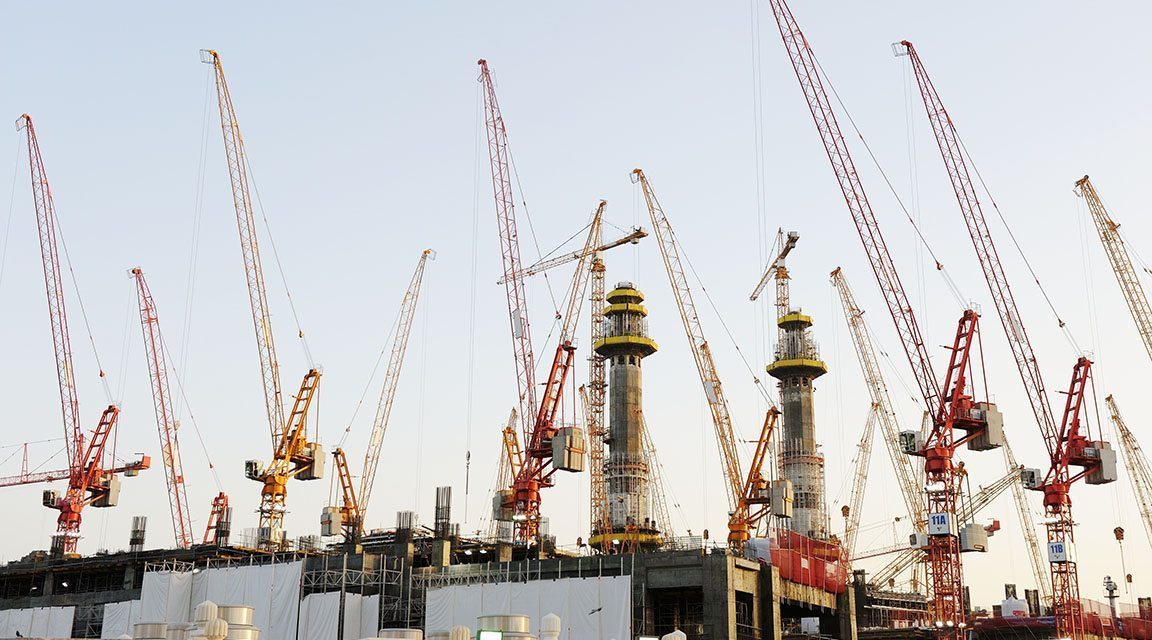

Contractor faces problems on multiple fronts in 2016
Riyadhs ordering Saudi Binladin Group (SBG) to stop work on Prophets Mosque in Medina in the final days of 2015 was a clear sign that this will be a tough year for Saudi Arabias largest construction company. Less than two months later, it seems the year is going to be even tougher.
The Ministry of Finance didnt give reasons why it has asked the largest contractor in the kingdom by turnover to cease work on Islams second holiest site. SBG has the expertise, resources and has delivered similar projects before. Yet despite its capabilities, it is not known if it will be retained as the main contractor once work resumes on Medina project.
Many in the industry view this episode as an indication of souring relations with the government, as a bad omen for a contractor that relies mainly on multi-billion dollar state contracts. The group is still involved in several large-scale developments in the kingdom its will hope future doesnt hold more such shocks.
The General Presidency for Grand Mosque and Prophet Mosque Affairs had appointed SBG as the main contractor on estimated $1.5bn makeover of the Prophets mosque in June 2012 with a completion date target of June 2016.
Shrinking backlog
The possible loss in Medina is perhaps the tip of the iceberg. Add to it the ban on winning new business in Saudi Arabia until SBG is cleared in the Mecca Grand Mosque crane accident, and until that happens, SBG doesnt have much to boast about the outlook of its order book.
MEED reported on 1 February that Riyadh has concluded investigations into September 2015 disaster when a crane collapsed on worshipers in the mosque, leaving 100 dead. It is understood that SBG is likely to get cleared to resume work on the site but it will have to pay hefty fines.
This adds to companys financial troubles as there are loan payments looming and like any other contractor in the kingdom, SBGs financial health is marred by bottlenecks in cash flows.
The company is currently in talks with Saudi and regional lenders to delay repaying some of the debt it owes. SBG is dealing with individual banks, especially, those that have financed the Mecca Grand Mosque Expansion project, for restructuring debt.
SBG is carrying out an estimated SR80bn-worth ($21.3bn-worth) of schemes and a Riyadh-based banker estimates that half of that amount could be leveraged from banks and other financial institutions.
If the companys financial difficulties aggravated any further, it would be a serious problem for banks, which are already grappling with a liquidity squeeze. The companys financial position was scrutinised by Saudi Arabias central bank last year. The regulators committee, comprising chief risk officers of local lenders, was tasked to evaluate the companys outstanding amount to local lenders and the risk of defaults.
A spokesman from the firm said financial decisions and actions by SBG are to be handled exclusively and directly between the companys finance department and relevant stakeholders, including the companys partners, the banks and other financial institutions. He, however, did not comment on whether SBG has missed any of the loan repayments, or whether it is preparing to enter a formal restructuring of its debts.
To address the financial squeeze, SBG is now looking to raise cash from regional and international lenders outside Saudi Arabia to meet some of its short-term liabilities. It has approached banks in Qatar and UAE for funding options as Saudi banks are already heavily exposed to the company and are reluctant to open new credit lines.
Banks are also worried about how much the company will have to pay in fines for Mecca crane disaster as a heavy financial penalty will further deplete cash reserves and it will increase the chances of defaulting on loans.
Property development
The company is now considering to diversify its business away from contracting for state entities. MEED reported on 31 January that SBG is mulling the option of establishing a new entity for real estate development. It holds a large land bank in and around major cities including the commercial hub of Jeddah and the Kingdoms Capital Riyadh and it plans to build large-scale commercial and residential projects, not only on its own land but also for third parties.
This will give the company a much needed alternative source of revenue and will help it save on an annual 2.5 per cent fee imposed by Riyadh on undeveloped urban land designated for residential or commercial use.
Until that happens or the company mends its relations with the government and start getting new contracting jobs in the kingdom, the doubts and uncertainties will persist and speculation about the companys future will continue.
You might also like...

Rainmaking in the world economy
19 April 2024

Oman receives Madha industrial city tender prices
19 April 2024

Neom seeks to raise funds in $1.3bn sukuk sale
19 April 2024

Saudi firm advances Neutral Zone real estate plans
19 April 2024
A MEED Subscription...
Subscribe or upgrade your current MEED.com package to support your strategic planning with the MENA region’s best source of business information. Proceed to our online shop below to find out more about the features in each package.






